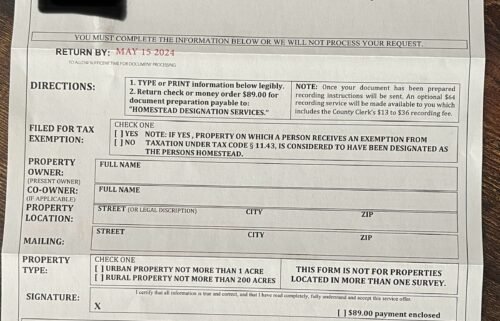El Paso OnlyFans creators say they find money and discrimination in their work

EL PASO, Texas -- Jackie, a mother from El Paso, created an account two years ago on OnlyFans, a subscription-based service where users or “fans” can pay to see content posted by creators.
Content on the site includes videos, photos and audio that range from cooking and singing to nude photos and videos. The platform allows anyone 18 and older to post for audiences who pay monthly subscriptions.
When Jackie, who asked to go by a different name to protect her identity, created her account, she had just moved back to El Paso and started by posting nude photos on the platform.
“I didn’t think that I would be able to make too much money on (OnlyFans),” said Jackie, who declined to specify her earnings.
The platform pays out over $5 billion annually to OnlyFans creators and takes 20% of what creators make. It’s been used by celebrities, social media influencers and even a former El Paso police officer.
Among the 1.5 million OnlyFans creators, only those in the top 2% in earnings make more than the $145 monthly average users make.
Jackie said she was able to live off the money she made from OnlyFans for “a long time” by posting nude photos and occasionally taking on custom requests from fans asking for personalized photos or videos.
Then, two years after making her account and just before she received her Ph.D., she stopped. Jackie archived her posts on OnlyFans and then left the platform.
Jackie said she left for multiple reasons, including her desire to find a different job and complete her graduate studies.
But while creators like Jackie are able to make money efficiently -- and legally -- some OnlyFans account holders say they are unjustly being labeled as sex workers and must contend with negative repercussions that result from that characterization.
The landscape that OnlyFans creators face has become more challenging than ever, sex work advocates say, as there are harmful stigmas and inequalities that sometimes restrict workers from buying a house, opening a bank account, holding a second job or even traveling outside of the United States that didn’t exist 10 years ago.
Gabriella Garcia, a writer and a postdoctoral fellow at the New York University Interactive Telecommunications Program whose research focuses on “cybernetic intimacy,” said banks and payment processors deny bank accounts or home loans for sex workers, and refuse to work with sites like OnlyFans.

“Platforms (like OnlyFans) really depend on the fact that people can get paid or pay across their platform,” Garcia said. “They’re really dependent on the fact that people can use things like PayPal or Venmo and all of these payment platforms are really supported by the big banks. Like PayPal doesn't exist without MasterCard or GPF, JP Morgan Chase, or you know, Citi Group.”
In response to articles about child exploitation on PornHub, Mastercard ended its partnership with the site and created new regulations surrounding adult content to filter out illegal posts. This then led to sites like OnlyFans feeling worried about their ability to pay their creators and their ability to get paid themselves, so they issued a ban on sexual content on the site.
The ban, which began Oct. 1, was created to prohibit sexually explicit content on the platform after OnlyFans officials cited the need to comply with their banking partners’ policies. But less than a week later, the company suspended the ban, announcing in a tweet it had “secured assurances necessary to support our diverse creator community,” allowing creators to again earn money from posting adult content.
But, Garcia asked in the process of her research, how does one tell the difference between a consenting couple and “literally human trafficking?”
“Until the decriminalization movement moves forward into a legal system … I don't think it can change,” Garcia said. “Like, there really has to be a place where people won't be punished by the law for doing consenting sex work before anything else can move forward.”
Jax, a non-binary 23-year-old El Pasoan who uses they/them pronouns, relies on OnlyFans as their main source of income.
Jax and their mother had been alone and searching for a way to make money after leaving a Mormon community in Chihuahua, Mexico.
“(I) didn’t know what I was gonna do with my life,“ Jax said. “(I was) depressed.”
Jax eventually found a job waiting tables in El Paso for about two months. Then the pandemic hit.
So Jax’s friend, an OnlyFans creator who had been on the platform for three years, suggested they join too. Jax thought, ‘Why not?’
“The pay and the food industry is crap and I didn’t want to go back four months later when they asked for ‘volunteers’ to come back and serve,” Jax said.
After creating the account, Jax was able to make a total of $7,598.44 between December 2020 and December 2021, mostly off of subscriptions, tips and messages.
Jax’s mother discovered the OnlyFans account where Jax posted nude photos and other sexual content in the form of short videos and told them they had to stop or move out immediately.
So Jax moved out.
“I wasn't scared of (identifying as a sex worker), but I was just scared of how certain people would perceive me,” Jax said.
Jax recalled crossing the U.S.-Mexico border for a photoshoot where they posed nude. Jax said the photo shoot made them feel strong and confident in their body, similar to how their OnlyFans content made them feel.
So when the U.S. Customs and Border Protection officer at one of the ports of entries asked them what they did for a living and Jax told them that they were a sex worker, Jax was upset, but not surprised, when the agent began to interrogate them, search their car and ask what Jax said were “prejudiced” questions.
“Other times after that I would lie just for my own wellbeing, I guess, because sex workers are obviously not viewed as people,” Jax said. “Also with being a white-passing person, I know that my experience is very different from other sex workers, especially sex workers that are brown and African American.”
With stigmas in mind, Jax realized that they had to work “harder and smarter” to not only keep up with the industry, but to make rent and keep food on the table, especially during a pandemic.
“We just want to be safe, seen and loved,” Jax said. “Todos somos la misma luz.”




